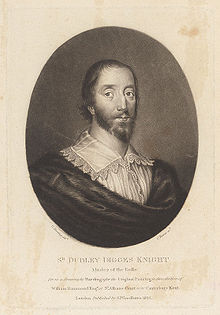- Dudley Digges
-
This article is about the seventeenth-century Member of Parliament. For the twentieth-century film and stage actor, see Dudley Digges (actor).
Sir Dudley Digges (Digges Court, Barham, Kent, 19 May c. 1583 – 18 March 1639), of Chilham Castle, Kent (which he completed in 1616), was a Member of Parliament, elected to the Parliament of 1614 [1] and that of 1621, and also a "Virginia adventurer," an investor who ventured his capital in the Virginia Company of London. Among the "planters," who emigrated in the 1640s, was Digges's son Edward, who became Governor of Virginia.
Contents
Life
Digges was the son of Sir Thomas Digges, the mathematician, and Anne St Leger (d. 1636), daughter of Warham St Leger[2] and connection of a branch of the Neville family.
He married Lady Mary Kempe, daughter and co-heir of Sir Thomas Kempe of Olantigh, Kent. They had eight sons and three daughters. Besides Edward, another son, Dudley (c. 1612-1643) published a treatise on the Illegality of Subjects taking up Arms against their Sovereigns (1643).
Having graduated from Christ Church, Oxford, in 1601, Digges was knighted by James I at Whitehall on 29 April 1607.
He was a friend of Henry Hudson; in 1610 he was one of those who fitted out Hudson for his last voyage, in which Cape Digges and Digges Islands were named for him. Later he backed the explorations of William Baffin in 1615 and 1616, with several of the same group of "adventurers".
Digges was named ambassador to Muscovy in 1618-19 and Special Ambassador to Holland (1620). In the Parliament of 1621, he was active in the impeachment of the Duke of Buckingham during the crisis of 1626 that followed the aborted expedition to Cadiz[3], when Digges and Archbishop Abbot co-operated to coordinate the attacks in the Houses of Lords and Commons. Digges was for a time imprisoned in the Fleet Prison by order of the King, but was released on apologizing to the King, an act that John Eliot was unwilling to perform. In 1630 he was appointed Master of the Rolls.
In 1631 he was one of the commission appointed by the Privy Council "to consider how the plantation of Virginia now standeth, and to consider what commodity may be raised in those parts," and subsequently (1634) was appointed Commissioner for Virginia Tobacco.
He left a fund in his will that provided, for some 200 years after his death, an annuity of £20 as prize money for races between the men and women of the parish of Chilham.
Works
Digges published several political and economic works, The Worthiness of Warre and Warriors (1604), The Defence of Trade (1615), Rights and Privileges of the Subject (1642), and, posthumously, The Compleat Ambassador: or Two Treaties of the Intended Marriage of Qu. Elizabeth of Glorious Memory (1655), a notable study of the two French marriage embassies, of Anjou and of Alençon, which revealed in unprecedented fashion the official despatches and correspondence and is a landmark in English historiography.
See also
Footnotes
- ^ House of Commons Journal Volume 1: 08 April 1614', Journal of the House of Commons: volume 1: 1547-1629 (1802), pp. 456-57. URL: http://www.british-history.ac.uk/report.asp?compid=9520. Date accessed: 01 April 2006.
- ^
 "St. Leger, Warham". Dictionary of National Biography. London: Smith, Elder & Co. 1885–1900.
"St. Leger, Warham". Dictionary of National Biography. London: Smith, Elder & Co. 1885–1900. - ^ "The laws of England have taught us that kings cannot command ill or unlawful things. And whatsoever ill events succeed, the executioners of such designs must answer for them". — Sir Dudley Digges, 1626, quoted by Sommerville.
References
- "William Baffin, 1615-16"
- Cambridge History of English and American Literature (1907–21), vol VII, ch. viii.4 The Compleat Ambassador.
- J.P. Sommerville, "The crisis of 1626"
- National Portrait Gallery, London: Sir Dudley Digges, sitter in three portraits (early nineteenth-century engraving and mezzotints after a painting)
Categories:- 1580s births
- 1639 deaths
- Ambassadors of England to Russia
- People of the Tudor period
- Members of the pre-1707 Parliament of England
- Masters of the Rolls
- 16th-century English people
- 17th-century English people
- People of the Stuart period
Wikimedia Foundation. 2010.

